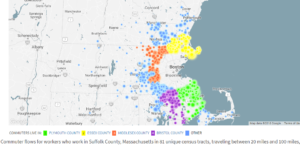What impact do Massachusetts home prices have on Boston commuters?
Massachusetts is commonly ranked one of the most expensive states in to live in, and recent housing market data indicates that isn’t likely to change any time soon. In June, the Massachusetts Association of Realtors (MAR) reported that the median price for a single family home had reached $430,000, an all-time high. The condominium market looks similar, with median prices reaching an unprecedented $390,000 according to MAR and the Warren Group.
One reason for the spike in home and condo prices is a lack of homes for sale. Specifically, the number of homes on the market declined 16% from last year. In Massachusetts, where a large portion of residents commute to Boston for work, the increase in home prices can have overarching consequences for residents.
Residents may move to and commute from neighboring states, where median home prices are drastically lower. The following table represents median home prices in Massachusetts and neighboring states, according to Zillow.
| State | Median Home Price |
| Massachusetts | $430,000 |
| Vermont | $195,000 |
| New Hampshire | $266,100 |
| Maine | $222,600 |
| Rhode Island | $276,000 |
| Connecticut | $240,300 |
Since the disparity in median home prices between Massachusetts and neighboring states is in the hundreds of thousands of dollars, many opt to commute from outside the state, which is now possible due to a variety of transportation options. For example, residents of Nashua, New Hampshire, where the median home price is $274,000, can commute to Boston via the Boston Express Bus. Residents of Wells, Maine, where the median home price is $289,200, can take the Amtrak Downeaster, which offers a monthly commuter pass and had a total ridership of 511,422 during the 2017 fiscal year.
In addition to problems that extend across state lines, the recent spike in median home prices also has repercussions within Massachusetts. Rising home prices make commuting from more distant towns within the commonwealth more appealing. Aided by commuter rail access to Boston, many can live farther from the city, where home prices are lower, and commute with relative ease, although both commuting times and costs are higher the further out the commuter resides.
The following graphs show median home prices for cities and towns that are roughly an hour from Boston via commuter rail and are at least 20 miles outside the city, as well as municipalities in Norfolk County, which lies in metropolitan Boston.


Although the commute is slightly longer, home prices in each of the five towns that are at least 20 miles from Boston and have 45-minute to one-hour commutes via commuter rail are below the Massachusetts median. In contrast, the towns listed in Norfolk County all have median home prices above the state median, with Wellesley exceeding $1 million. Clearly, housing prices are determined by factors that aren’t limited to commuting time to Boston.
Below is a screenshot from an interactive map that analyzes the trends of workers commuting into Suffolk County, where Boston is located, from 20-100 miles away. The map is from 2016, the last year for which data is available.

This map illustrates the commutes of roughly 31,000 Suffolk County workers, with the dots signifying where they reside. Plymouth County, which includes the town of Middleborough, accounts for the largest number of commuters in this data set, with roughly 8,300 residents commuting to Suffolk County for work. The next largest is Essex County, where Haverhill and Lawrence are located and has roughly 5,600 Suffolk county commuters.
As of 2016, over 30,000 Suffolk County workers commuted to their jobs from at least 20 miles away. Based on the recent spike in Massachusetts housing prices, it is likely that more and more workers will opt to follow suit and commute from farther away, where home prices are likely to be more affordable.
Aided by increased accessibility to Boston via commuter rail, workers are able to commute from places like Plymouth and Essex Counties, which are farther away, where homes are more affordable. Additionally, the fact that the median Massachusetts home price is over $100,000 more than in neighboring states has opened the door for out-of-state residents to commute across state lines via buses, Amtrak, or by car. Only time will tell how the spike in home prices will impact commuting into Boston, but all signs point to more people opting to commute from farther away, where homes are more affordable.
Jay Anderson is a Northeastern University Co-Op at the Pioneer Institute; he is a Political Science major.



